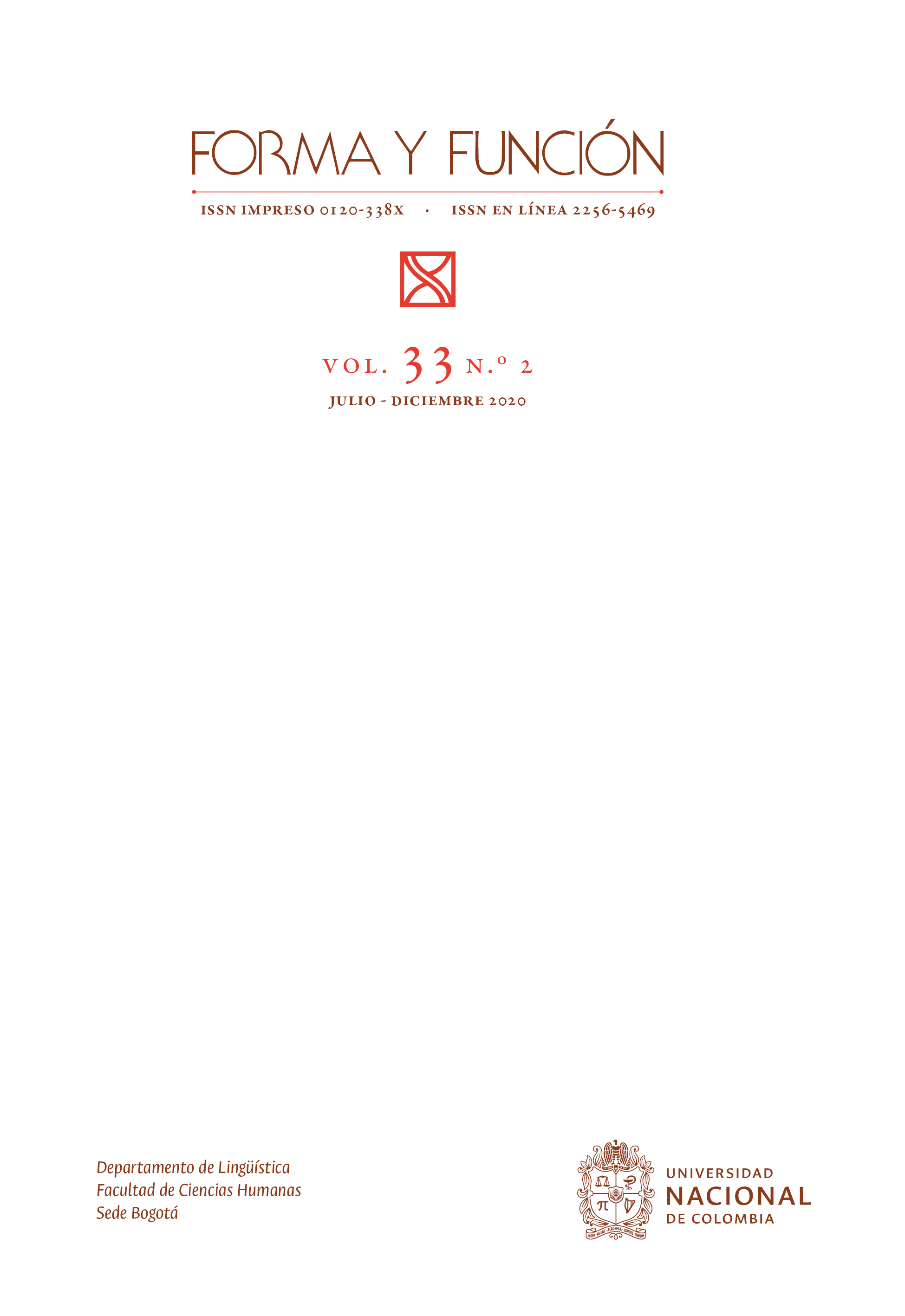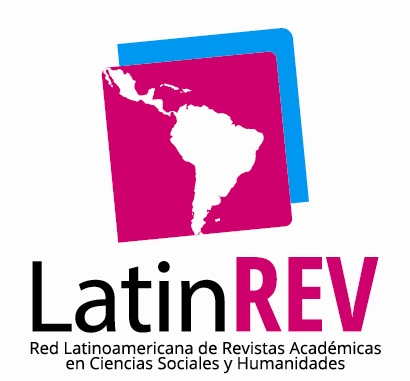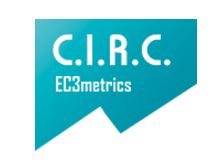Retóricas revolucionárias na linguística: recepção de teorias e novidade científica
Revolutionary Rhetoric in Linguistics: Reception of Theories and Scientific Innovation
Retóricas revolucionarias en la lingüística: recepción de teorías y novedad científica
DOI:
https://doi.org/10.15446/fyf.v33n2.79840Keywords:
gramática construtural, gramática generativa, historiografia da linguística, linguística brasileira, retórica revolucionária (pt)construction grammar, generative grammar, historiography of linguistics, Brazilian linguistics, revolutionary rhetoric (en)
gramática constructiva, gramática generativa, historiografía de la lingüística, lingüística brasilera, retórica revolucionaria (es)
Downloads
O objetivo deste artigo é discutir a noção de revolução na história da linguística a partir da observação da retórica de linguistas circunscritos a determinadas comunidades de pesquisadores. Propõe-se uma interpretação (a partir de um quadro sociorretórico de análise em Historiografia Linguística) de dois momentos da história da linguística brasileira (considerada exemplo analítico a sustentar uma reflexão meta-historiográfica) em que linguistas advogaram por rupturas revolucionárias na ciência da linguagem. Constituem-se como material de análise: (1) a resenha de Miriam Lemle de 1967, marco da recepção brasileira à Gramática Generativa; (2) o manifesto que elaborou o programa da Gramática Construtural em 1973. Entende-se que uma análise dos posicionamentos discursivos dos cientistas permite evidenciar o humano na prática científica, muitas vezes negado, ainda que presente nas disputas intelectuais e institucionais que caracterizam o pensamento científico.
The article aims to discuss the concept of revolution in the history of linguistics from the study of the rhetoric used by linguists within certain research communities. One proposes an interpretation (from a socio-rhetoric framework of analysis in Linguistic Historiography) of two moments in the history of the Brazilian linguistics (as an analytical example to support a meta-historiographic reflection), in which linguists advocated a revolutionary rupture in the science of language. One bases the analysis on: (1) the review by Miriam Lemne in 1967, a milestone in the Brazilian reception of the Generative Grammar, (2) the manifest of the Construction Grammar in 1973. One assumes that an analysis of the discursive position of scientists helps to reveal the human component in the scientific practice, which is often denied, but is present in the intellectual and institutional arguments typical of the scientific thought.
The article aims to discuss the concept of revolution in the history of linguistics from the study of the rhetoric used by linguists within certain research communities. One proposes an interpretation (from a socio-rhetoric framework of analysis in Linguistic Historiography) of two moments in the history of the Brazilian linguistics (as an analytical example to support a meta-historiographic reflection), in which linguists advocated a revolutionary rupture in the science of language. One bases the analysis on: (1) the review by Miriam Lemne in 1967, a milestone in the Brazilian reception of the Generative Grammar, (2) the manifest of the Construction Grammar in 1973. One assumes that an analysis of the discursive position of scientists helps to reveal the human component in the scientific practice, which is often denied, but is present in the intellectual and institutional arguments typical of the scientific thought.References
Altman, C. (1998). A pesquisa linguística no Brasil (1968-1988). São Paulo: Humanitas.
Back, E., & Mattos, G. (1972). Gramática construtural da Língua Portuguesa. São Paulo: ftd.
Back, E., & Mattos, G. (1973). Linguística Construtural: manifesto. Construtura. Revista de Linguística, Língua e Literatura, 1, 1-128.
Batista, R. O. (2007). A recepção à Gramática Gerativa no Brasil (1967-1983): um estudo historiográfico (tese de doutorado). Universidade de São Paulo, Brasil.
Batista, R. O. (2010). Em busca de uma história a ser contada: a recepção brasileira à Gramática Gerativa. Revista da Anpoll, 1(29), 260-291. doi: https://doi.org/10.18309/anp.v1i29.181
Batista, R. O. (2013). Uma técnica, um grupo e uma retórica: a Gramática Construtural na história da linguística brasileira. Revista Letras, 87, 39-66. doi: https://doi.org/10.5380/rel.v87i1.32039
Batista, R. O. (2015). Retórica de ruptura e descontinuidades nas ciências da linguagem: um estudo pela Historiografia da Linguística. Confluência, 49, 119-141. doi: https://doi.org/10.18364/rc.v1i49.100
Batista, R. O. (2018). História da linguística e retórica revolucionária. Lingüística, 34(2), 145-168.
Batista, R. O. (2019a). Historiografia da Linguística e um quadro sociorretórico de análise. Em R. O. Batista. (org.). Historiografia da Linguística (pp. 81-113). São Paulo: Contexto.
Batista, R. O. (org.). (2019b) Historiografia da Linguística. São Paulo: Contexto.
Borges Neto, J. (2004). Ensaios de Filosofia da Linguística. São Paulo: Parábola.
Gross, A. G. (1990). The Rhetoric of Science. Cambridge: Harvard University Press.
Harman, P. M. (1995). A revolução científica. São Paulo: Ática.
Harris, R. A. (1993). The linguistic wars. New York-Oxford: Oxford University Press.
Joseph, J. E. (1995). The structure of linguistic revolutions. Historiographia Linguistica, xxii(3), 379-399. doi: https://doi.org/10.1075/hl.22.3.07jos
Koerner, E. F. K. (1999). The concept of ‘revolution’ in linguistics: historical, methodological, and philosophical issues. Em E. K. K. Koerner, Linguistic Historiography: Projects & Prospects (pp. 85-96). Amsterdam: John Benjamins. doi: https://doi.org/10.1075/sihols.94.05koe
Kuhn, T.S. (2000[1962]). A estrutura das revoluções científicas (B. V. Boeira, & N. Boeira, trads.). São Paulo: Perspectiva.
Lemle, M. (1967). Um novo estruturalismo em linguística: Chomsky. Tempo Brasileiro, 15/16, 55-69.
Marcondes, D. (2016). Textos básicos de filosofia e história das ciências: a revolução científica. Rio de Janeiro: Zahar.
Murray, S. O. (1994). Theory groups and the study of language in North America. Amsterdam: John Benjamins. doi: https://doi.org/10.1075/sihols.69
Swiggers, P. (2019). Historiografia da Linguística: princípios, perspectivas, problemas. Em R. O. Batista (Org.). Historiografia da Linguística (pp. 45-80). São Paulo: Contexto.
Ziman, J. (1979[1968]). O conhecimento público (R. R. Junqueira, trad.). Belo Horizonte: Itatiaia; São Paulo: Universidade de São Paulo.
How to Cite
APA
ACM
ACS
ABNT
Chicago
Harvard
IEEE
MLA
Turabian
Vancouver
Download Citation
License
Copyright (c) 2020 Forma y Función

This work is licensed under a Creative Commons Attribution-NonCommercial-ShareAlike 4.0 International License.

Forma y Función subscribes to the Open Journal System, which means that access to it is open. Access to the Journal’s content is free and immediate under the principle that freely available research contributes to global dissemination of knowledge and the academic exchange propitious to links among scientific communities. Users can search, read, copy, download, and share all of the published texts. Their use is authorized as long as credit is granted to the authors of the texts and to Forma y Función as the original source of the publication. The commercial use of copies and distribution of content is not permitted, nor the adaption, derivation or transformation of any of these without the prior authorization of the authors and the editor of Forma y Función.
The contents of the journal are published as open access under Common Creative License Attribution-NonCommercial-ShareAlike 4.0. For more information on the license terms, please consult: https://creativecommons.org/licenses/by-nc-sa/4.0.
In line with the open access policy, Forma y Función does not charge for the processing of submitted texts or for publication.




























